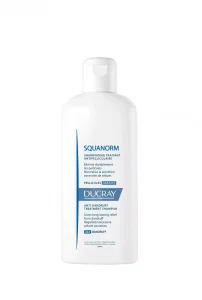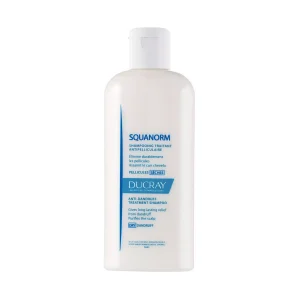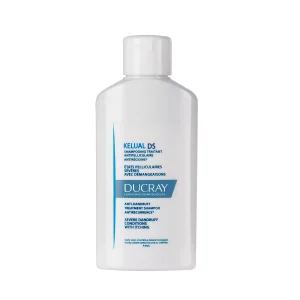
Dandruff is a common scalp condition that affects many people, but it’s the subject of many myths and misconceptions. Are you one of those people who have heard dandruff myths and believed they were true? If so, you should read this article from The Dermo Lab to find out the facts about dandruff treatments and remedies and debunk some of the most common myths associated with it.
Myth #1: Dandruff is always caused by a dry scalp.
If your skin is dry, or if you suffer from contact dermatitis which leads to dry skin, this can certainly cause flaking, itching and even peeling of the skin.
But having an oily scalp can also be an important factor. Malassezia yeasts – those linked to seborrheic dermatitis – feed on the oil (sebum) present on the skin and scalp. They thrive when there is more sebum, making the condition more common when the scalp is oilier.
To treat dandruff correctly, it’s important to know whether your scalp tends to be oily or dry.
Myth #2: Dandruff is caused by a lack of hygiene.
Dandruff is not caused by a lack of hygiene. While it’s true that not washing your hair regularly can contribute to the build-up of sebum and dead cells on the scalp, it’s not the only cause of dandruff. In fact, excessive hair washing can strip the scalp of its natural oils, leading to dryness and flaking.
Myth #3: Dandruff is contagious.
Dandruff is not contagious. It’s a common condition that affects many people but is not transmitted from person to person through contact. However, some fungal infections of the scalp can be contagious. So it’s important to consult a doctor if you have persistent dandruff that doesn’t respond to over-the-counter treatments.
Myth #4: Dandruff only affects people with oily hair.
Dandruff can affect all hair types, including dry hair. While oily skin and hair can contribute to dandruff, dry skin can also lead to flaky, itchy scalp.
In fact, the use of harsh shampoos or styling products can strip the scalp of its natural oils, leading to dryness and dandruff.
Myth #5: Dandruff is just a cosmetic problem.
Dandruff can be more than just a cosmetic problem. Persistent dandruff can lead to inflammation of the scalp, which can cause itching, redness, and even, in some cases, hair loss.
In addition, some sufferers of severe dandruff may experience social anxiety and embarrassment, which can harm their quality of life.
Myth #6: Dandruff is linked to hair loss.
Hair loss can be the result of a combination of factors, including:
- heredity
- stress
- age
- medical conditions
- medication
- hormonal changes
…but not dandruff! While it’s possible for excessive and prolonged itching to cause scarring of the scalp skin, it’s rare for the damage to be so severe as to result in significant hair loss from damaged hair follicles.
Myth #7: All flakes are dandruff.
In addition to dandruff and dry skin, many other conditions can lead to a flaky scalp, including seborrheic dermatitis, psoriasis, skin lesions, contact dermatitis, climate changes, ringworm, and many more. These conditions have different symptoms and should be examined by a doctor. Once again, we recommend that you consult your dermatologist to confirm the diagnosis and method of treatment.
Myth #8: Oil treatments are the cure.
Since oily skin is one of the main causes of dandruff, adding oil to your scalp could actually perpetuate the problem rather than solve it. The key is to find a happy medium. For example, investing in a gentle, moisturizing shampoo can help hydrate your hair without making it too greasy. Remember that everyone’s scalp is different and may require a different treatment method.
Myth #9: Dandruff is worse in summer.
In reality, there’s no real seasonality to dandruff. Some people suffer more in winter, when the air is less humid, causing the scalp to sweat and dry out. Moreover, most people reduce their shampoos due to colder temperatures, which can also aggravate the build-up of products and dandruff on the scalp. Others find that hot, humid summer weather aggravates their dandruff, perhaps because their scalp is oilier due to sweat. Finally, some people suffer from dandruff all year round.
Myth #10: You should wash your hair less often if you have dandruff.
If you think your dandruff is due to a dry scalp, it may be tempting to cut back on washing frequency. But whether the cause is dryness or excess sebum, you should actually wash your hair regularly enough to rinse away dandruff and any build-up of debris on your scalp.
So what’s the best way to treat dandruff?
If you have dandruff, there are several steps you can take to treat it:
1) Adopt good scalp hygiene: Wash your hair regularly with a mild shampoo and avoid scratching your scalp, which can cause irritation and inflammation. Look for shampoos containing ingredients such as salicylic acid, coal tar, or ketoconazole, which are specifically designed to combat dandruff.
Our choices of anti-dandruff shampoos :
For oily dandruff:
Ducray Squanorm Anti-Dandruff Treatment Shampoo – Oily Dandruff
For dry dandruff:
Ducray Squanorm Anti-Dandruff Treatment Shampoo – Dry Dandruff
For dandruff caused by seborrheic dermatitis:
Ducray Kelual DS Treatment Shampoo
2) Avoid aggressive styling products: Aggressive shampoos, conditioners, and styling products can strip the scalp of its natural oils, leading to dryness and flaking. Look for gentle, moisturizing products, free from sulfates and other harsh chemicals.
3) Manage stress: Stress can trigger or exacerbate dandruff in some people. Try relaxation techniques such as deep breathing, meditation, or yoga to help manage stress.
Dandruff is a common scalp condition that can be annoying, but there’s no need to be embarrassed about it or fear it’s contagious. Separating fact from fiction in dandruff treatments and remedies can help you take the necessary steps to manage and control it effectively.
Remember that dandruff is not caused by a lack of hygiene, that it can affect all hair types, and that there is no cure. However, good scalp hygiene, the right products, and a healthy lifestyle will enable you to minimize symptoms and prevent them from interfering with your daily life.
So, the next time you see dandruff, remember the facts and take steps to keep your scalp healthy and happy!
Last Updated on March 6, 2024











